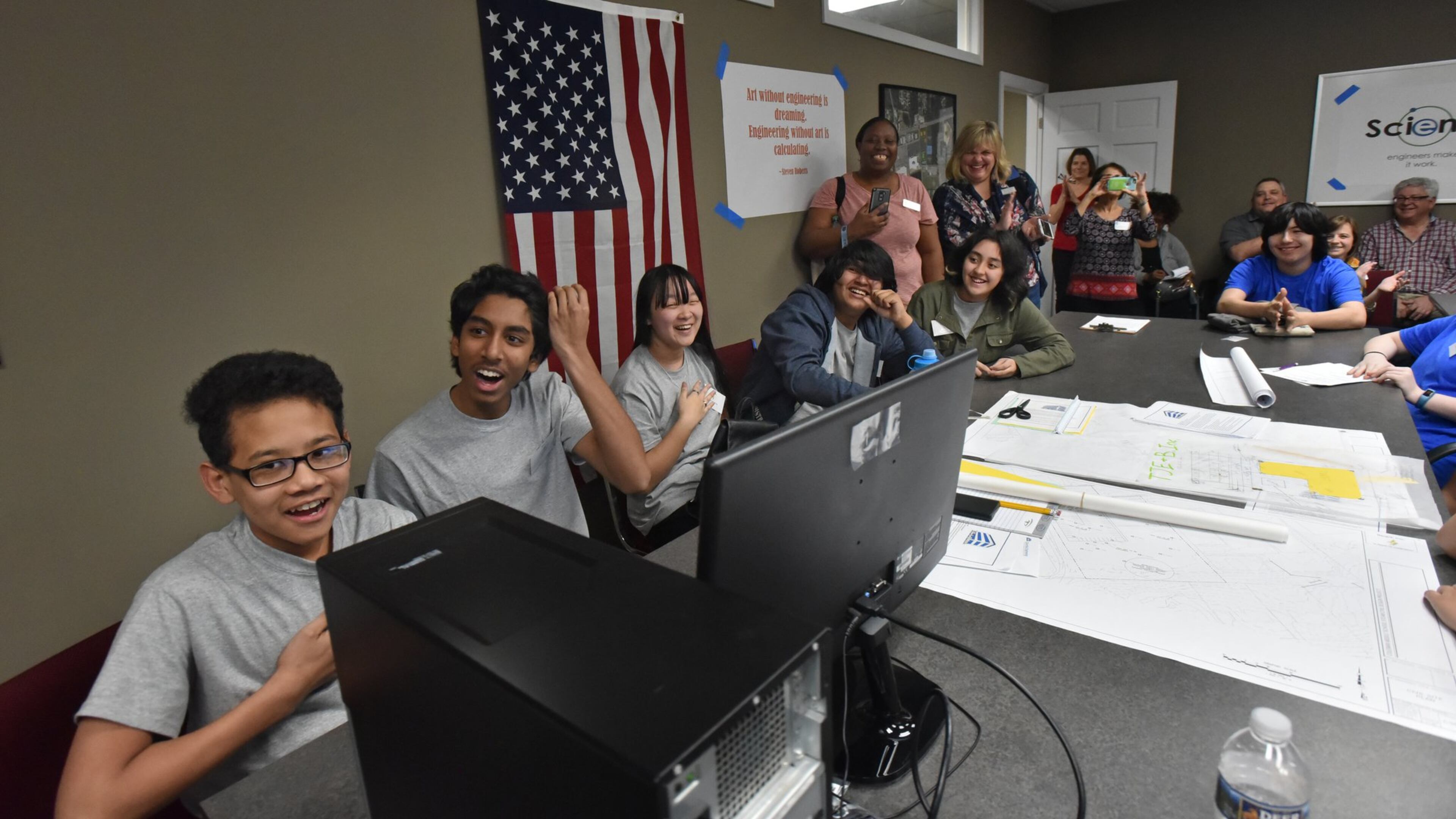Engineering firm shows students how lessons apply in real world

A primary focus of today’s school systems is educating students with an eye toward career goals, so engaging private businesses is key. A recent outing sponsored by Columbia Engineering, a community partner with nearby Coleman Middle School, shows why.
It gave a group of eighth-graders what teacher LaShandia Hill called “a true ‘day in the life’ experience. They get the chance to see that the math, science, social studies and art classes come together in a real profession.”
She teaches the Fundamentals of Engineering class, and her 28 students explored the roles of real civil engineers by learning to use the computer software and speak the jargon but, more importantly, get the job done.
On Tuesday, Feb. 20, 2o boys and eight girls walked the few blocks along Buford Highway in Duluth to put classroom concepts toward practical applications.
Randy Strunk, associate owner and professional engineer at Columbia Engineering, along with Linda Cerjan, Columbia’s marketing manager who also is on the Coleman Middle School Advisory Committee, set it up. They created a scenario where the kids met with a client to plan an actual building using a specific set of requirements.
Strunk wanted to take the experience further than a “lunch and learn” session.
“We could do a Power Point presentation and answer questions about our roles, education, salaries, etc., but actually doing what we do will allow them to really grasp how what they learn in class translates into what we do on the job.”
That fits the school’s STEAM curriculum (Science, technology, engineering, art and math) emphasis on project-based learning. Students aren’t just encouraged but required to collaborate and build teams where they learn together and from each other.
To earn STEM certification, (STEAM without the “Art”) schools must submit an application showing they meet specific criteria, including evidence of teacher collaboration, business and industry partnerships, high levels of math and science instruction and an integrated, project-based curriculum.
Gwinnett County Public Schools received an Innovation Grant project funded by Governor’s Office of Student Achievement for STEAM projects. Coleman is the first certified STEAM middle school in the state, and the second school, to earn STEAM School Certification. Coleman received certification in May, but it must be renewed every five years. A team from the Georgia Department of Education visits each school to observe its program to maintain certification.
“It’s not an easy curriculum to teach,” said Hill. “There’s a lot of observation of the group dynamic and assessing areas where they need more instruction and making sure everyone is on pace.”
And although work is the goal, there are fun times as well.
“We have team-building exercises just like in corporate American,” said Hill. “They may not receive a grade for that, but it helps me guide them along their path.”
As one of the few girls in the class, Cori Helms said engineering caught her interest as a small child.
“I really liked to make things with household items — cans, cardboard,” she said. “It’s really cool to see that we can sketch out ideas that will one day be a building or something like that.”
Although some of the coursework can be difficult, she said she enjoys challenging herself. Classmate Jackson Martinez agreed that the class is not for those with a passing fancy.
“I was very interested in the computer programs,” he said. “That’s the area I’d like to work in. Maybe I could be a support person to an office like this — but I’d have to know what they’re doing to be of help.”
That kind of vision is why this type of exercise is good for the professionals as well as the students, said Strunk. The kids didn’t know that the specs were actually for the building they were in.
“They might have a concept that we didn’t realize with this structure,” said Strunk. “There is no right answer to this kind of thing. There are many ways to fulfill the client’s needs.”
Although Columbia Engineering didn’t need arm-twisting to get involved, Adam Forrand, director of education and talent development for the Gwinnett Chamber, said this kind of hands-on partnership is a win for everyone involved.
“This shows the community that talent is just around the corner,” he said. “The proximity makes it easy for Columbia to be involved with growing the staff it needs. The return on investment is huge.”
When Coleman came online two years ago, it was this type of community involvement that everyone envisioned.
“We utilized the rubric provided by the state when we were first certified and use their suggestions to keep improving what we are doing. Our partnerships with our community, our business partners, the city of Duluth and our parents continue to get stronger each day,” said Coleman STEAM Coordinator Sheila Harmony. “As a STEAM school we work very hard to build and maintain these relationships. We have community members help us plan activities, events, field trips, etc. They are a instrumental part of our school, our mission and our vision.”
Project-based learning in action
The 28 Coleman students, divided into six groups, functioned as independent civil engineering firms for the program day, complete with student-chosen firm names and student-created logos.
Approximately 20 of Columbia Engineering’s 39 staff members were involved in providing the hands-on engineering experience. The day included information sessions on client interaction and expectations, an overview of land planning and site design, restrictions, parking needs, drainage, entrance and exit requirements from the main road, and water quality.
The day culminated with students completing a site design and presenting it to a panel of engineering judges.



